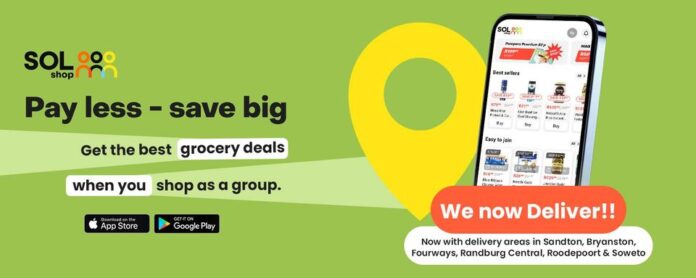Small-scale farmers in South Africa face significant challenges. Farming is a capital-intensive, uncertain process, with punishingly tight margins. A multitude of costs, including transport, storage, agricultural inputs and energy eat into revenue. After all this, your product is sold to one of several intermediaries before it ends up in retail stores.
Consumers are also feeling the pressure. As food and fuel prices continue to rise, shoppers are looking for ways to obtain better prices and more direct relationships with producers. The answer to both these problems could lie in innovative new group-buying platforms such as SOLshop.
Group buying, or “social e-commerce” platforms allow groups of individual consumers to easily coordinate buying activities, benefiting from group discounts. SOLshop collaborates directly with local farmers and producers, allowing lower-than-wholesale prices on food, including fruits and vegetables, as well as household and beauty products. SOLshop users form groups of friends or other app users to access these deals. The more shoppers that collaborate, the bigger the savings.
Jonathan Holden, COO of SOLshop, says, “The SOLshop marketplace is not only about group buying but is an ideal opportunity for farmers and local producers to sell their products directly through the platform. With the cost of living on the rise, this easy-to-operate platform provides a practical solution for individuals to buy in bulk and save, and for producers to live the farm-to-table movement, creating a win-win situation for both parties.”
As Cobus de Bruyn, Nedbank’s Head of CVPs for Agriculture, recently wrote: “Traditional agricultural value chains involve multiple intermediaries between farmers and consumers. Typically, farmers sell their produce at the farm gate to middlemen. Produce then passes through multiple intermediaries – each of which adds margins – before reaching the consumer. Agricultural e-commerce provides a simplified approach to trading because buyers and sellers are directly linked. This streamlines the agricultural value chain and reduces inefficiencies in the distribution of farm produce.”
This simplified process puts farmers in direct contact with new markets and allows them to increase profit margins. It also has the potential to reduce wastage and costs associated with transport, storage and logistics, with associated reductions in greenhouse gas emissions and other pollutant effects. For consumers, direct links with farmers lower prices and result in more authentic connections with local producers and produce.
If these effects are sustainably realised it could be transformative for the agricultural sector, removing many of the barriers to entry for prospective small-scale farmers in South Africa and beyond.
In South Africa, the social e-commerce market is led by SOLshop. SOLshop connects wholesalers and customers in one friendly ecosystem, allowing individuals to conveniently access daily discounts on hundreds of products through the SOLshop app.
SOLshop has a large and growing delivery zone and 15+ pickup points around Johannesburg and has grown rapidly based on its ability to connect consumers with low prices and local producers.
The group-buying model has the potential to scale significantly in South Africa, which is a well-connected country with a high cell-phone penetration rate, and strong consumer pressure to benefit from lowering grocery and household-item budgets while building networks and communities.








